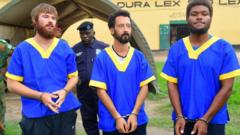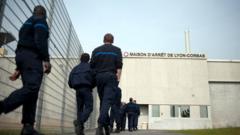Three Americans convicted in a failed coup attempt in the Democratic Republic of Congo have been sent back to the U.S. to serve their life sentences in a move reflecting ongoing diplomatic efforts between the two nations over the country’s mineral wealth.
Americans Repatriated After DR Congo Coup Conviction

Americans Repatriated After DR Congo Coup Conviction
Three Americans convicted in a failed coup attempt in DR Congo are returned to the U.S. to serve their sentences, following diplomatic negotiations.
Three Americans implicated in a failed coup attempt in the Democratic Republic of Congo (DRC) have been repatriated to the United States to complete their sentences. Initially sentenced to death by a military court alongside 37 others for their role in the attack on the presidential palace last May, their sentences were recently commuted to life in prison.
The U.S. State Department confirmed the return of Marcel Malanga Malu, Tylor Thomson, and Zalman Polun Benjamin, who were escorted from N'Djili International Airport in Kinshasa under strict legal protocols. This repatriation aligns with heightened communications between the U.S. and DRC as the two countries explore partnerships to tap into the DRC's vast mineral resources.
In the wake of the Americans' repatriation, Tammy Bruce, a spokesperson for the U.S. Department of State, emphasized the importance of holding the individuals accountable while ensuring humane treatment and fair legal processes. Diplomatic talks reportedly included multibillion-dollar investments related to the extraction of valuable minerals like coltan and cobalt.
The transfer signals a significant step in judicial collaboration and human rights dialogue between the two nations. Jean-Jacques Wondo, a dual citizen of Congo and Belgium, was also among those implicated and was transferred to Belgium earlier this year due to health concerns. The legal status of the other convicts—many of whom include foreign nationals—is uncertain as discussions surrounding their sentences continue.
This poignant case underlines the complexities of international relations, highlighting the intersection of justice, diplomatic negotiations, and the lucrative mining sector in the DRC. As the U.S. reassesses its involvement and response to such international incidents, the focus remains on ethical accountability and cooperative governance.





















